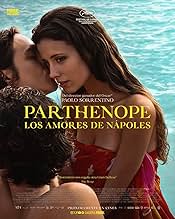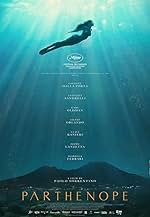Partenope ist eine Frau, die den Namen ihrer Stadt trägt. Ist sie eine Sirene oder ein Mythos?Partenope ist eine Frau, die den Namen ihrer Stadt trägt. Ist sie eine Sirene oder ein Mythos?Partenope ist eine Frau, die den Namen ihrer Stadt trägt. Ist sie eine Sirene oder ein Mythos?
- Regie
- Drehbuch
- Hauptbesetzung
- Auszeichnungen
- 7 Gewinne & 25 Nominierungen insgesamt
Antonio Annina
- Raimondo 10 anni
- (as Antonino Annina)
Maria Rosaria Bozzon
- Vecchia megera
- (as Mariarosaria Bozzon)
Zusammenfassung
Reviewers say 'Parthenope' by Paolo Sorrentino is visually stunning with breathtaking cinematography and beautiful Naples scenery. It explores themes of beauty, youth, love, and self-discovery. Celeste Dalla Porta's performance is praised for its allure and enigmatic quality. However, the film has mixed reviews, with some finding it pretentious and lacking substance, focusing too much on aesthetics. The narrative structure and character development are contentious, with some appreciating the philosophical approach and others finding it incoherent and shallow.
Empfohlene Bewertungen
Why would you watch this movie? Probably based on what we know that is said about Sorrentino and his perfect eye for the breathtaking visuals. Indeed, with the first shot in the movie he makes it clear - showing a carriage and the "Captain" floating on the sea with the view on the stunning coast of Napoli!
Not its beauty, but the Napoli itself is one of the key topics. If this city could be personified, it will definitely be a beautiful woman. Only, just like a person, Napoli is much more than a beauty and it definitely has its dark places.
It personally touched me that one of the key topics (and a key question) is also (what is) a study of Anthropology. Anthropology, formed of two Latin words, meaning a person and science. No other study could have been better for this movie, rather than a study of the most complicated being in this world. I will save you from spoilers and let you think of what Anthropology is before the movie answers it for you, but keep in mind that it is shown by the biggest "superpowers" of Parthenope and especially in her brother Raimondo, who in my opinion was the one that taught that to Parthenope.
The third matter that made me absolutely passionate about this movie was the precise choice of words and creation of dialogues. Her love interests were mostly people who had the most beautiful way of expressing their emotions. Listing to their dialogues made me feel like I've read a book.
I highly recommend watching this movie, although it may have some bizarre moments that can make you feel uneasy. But if you are open to understanding and accepting the strangeness, it will definitely let you "get carried away."
Not its beauty, but the Napoli itself is one of the key topics. If this city could be personified, it will definitely be a beautiful woman. Only, just like a person, Napoli is much more than a beauty and it definitely has its dark places.
It personally touched me that one of the key topics (and a key question) is also (what is) a study of Anthropology. Anthropology, formed of two Latin words, meaning a person and science. No other study could have been better for this movie, rather than a study of the most complicated being in this world. I will save you from spoilers and let you think of what Anthropology is before the movie answers it for you, but keep in mind that it is shown by the biggest "superpowers" of Parthenope and especially in her brother Raimondo, who in my opinion was the one that taught that to Parthenope.
The third matter that made me absolutely passionate about this movie was the precise choice of words and creation of dialogues. Her love interests were mostly people who had the most beautiful way of expressing their emotions. Listing to their dialogues made me feel like I've read a book.
I highly recommend watching this movie, although it may have some bizarre moments that can make you feel uneasy. But if you are open to understanding and accepting the strangeness, it will definitely let you "get carried away."
I was so close to leaving the cinema half way through this film, but stayed. And the best bits are actually in the 2nd half so Im giving it 6 stars instead of the 4 which the first half deserved. However, I still dont think this is a good movie. Fantastic visually yes, for Sorrentino is a master of unforgettable filmic tableaus, but that just isn't enough.
The overall problem...There is no plot, it's more a series of separate scenes on narcissism, or rather that's how they come across. I think Sorrentino wanted to create something profound but the result feels contrived and sad.
And then there's the anticlimactic ending - a sudden flash forward 50 years to an oddly empty/vacant character that is Parthenope in her 70s. What? Why?
The overall problem...There is no plot, it's more a series of separate scenes on narcissism, or rather that's how they come across. I think Sorrentino wanted to create something profound but the result feels contrived and sad.
And then there's the anticlimactic ending - a sudden flash forward 50 years to an oddly empty/vacant character that is Parthenope in her 70s. What? Why?
Along the lines of the legendary beauty Aphrodite, "Parthenope" (Celeste Dalla Porta) was born in the sea and grew to become a great temptress to both of her male contemporaries. The first being her obsessed brother "Raimondo" (Daniele Rienzo) and the other her adoring childhood friend "Sandrino" (Dario Alta) whose unrequited love for her drove him to distraction. Not, however, to such distraction as that of her sibling, It's when the trio decide to head for an unfunded trip from their home in Naples to the nearby island of Capri that she meets elderly American writer/dipso "Cheever" (Gary Oldman) who finds her intriguing but appears to have a certain immunity to her charms and she's not used to that. Whilst on this carefree trip there befalls a tragic realisation that causes all of them to appreciate the stark realities and fickle shallowness of their lives and brings into focus senses of grief, rejection and emptiness. It's a beautifully photographed piece of cinema, this film, with sparing dialogue and a sexually, but not explicitly so, charged chemistry abundant throughout this rather visually extravagant but disappointingly soulless drama. It is a bit like a postcard upon which is a beautiful picture but just too few words to develop the characters or to quite put enough meat on their perfectly formed bones. Indeed as the second hour starts to drag, the whole thing begins to look more like a repetitively self-indulgent vanity exercise that might be rooted in mythology but that struggles to engage beyond the superficial. It's classy and stylish and well worth a look - but look appears to be all Paolo Sorrentino wants us to do.
"As complete as she is-with all her goods and her ills-do you know who she reminds me of?... Naples"
"The most beautiful gift is not the most expensive; it is the most fragile." Marques Rebelo, O Trapicheiro.
As the lights of the nineteenth century faded, Eça de Queirós-the great Eça-painted, through the face of Gonçalo Mendes Ramires, a symbolic portrait of Portugal that, as any good symbol does, contained everything, even when it sometimes seemed to contain nothing at all. Last year, Paolo Sorrentino, the great artist of contemporary cinema, painted with the face and body of Parthenope the symbolic portrait of Naples: yet another of his masterpieces, unveiling a city and a woman that, in the blink of an eye, are one in the lyrical conception of poet Sorrentino. Naples, or Parthenope- a name that evokes the mythological siren whose body is said to have given birth to the city-is not merely a backdrop, but a pulsating character. And Parthenope, the protagonist (portrayed with an ethereal melancholy), is its incarnation: born in the waters of the Mediterranean, like Venus, like Naples, she carries within her the contradiction of the sublime and the grotesque, of desire and death.
Sorrentino, heir to a Fellini-esque sensitivity for both beauty and the bizarre, does not fear excess. In scenes such as the party in Capri-where beautiful faces and bodies dissolved under golden lights-Parthenope, in her melancholy, asks her millionaire admirer: "Lei non pensa che il desiderio sia un mistero e il sesso il suo funerale?" [don't you think that desire is a mystery and sex its funeral]. The phrase echoes like an epitaph, laid bare to reveal the fragility and preciousness of desire and youth: desire as an unfathomable mystery, and sex as the funeral ritual of something that will never be consummated. It is in this interplay of opposites that the narrative unfolds, between the sculptural beauty of Naples' landscapes and the harshness of its forgotten alleys, where the protagonist walks with Roberto, an ambiguous character who unveils to her the other side of the city-a Naples both raw and poetic, where the contrast between the opulent luxury of grand houses and the simplicity of neglected corners becomes a metaphor for the city's inherent duality. Every step, every exchanged glance, carries the tension between the ephemeral and the eternal, between the urgent and the trivial. There, in the interplay of shadow and light, "the irrelevant merges with the decisive," as if chance itself became the silent arbiter of destinies. But is there any sense in speaking of chance? In song, Riccardo Cocciante tells us otherwise-everything was already foreseen.
"Beauty is like war: it opens doors," declares the alcoholic writer John Cheever (portrayed by Gary Oldman) in his brief, ghostly appearance. Drunkenly, he murmurs about the "scent of dead loves," a fragrance he claims to detect in his hotel room, surrounded by bottles of alcohol. So many dead loves in the city, in Parthenope's life. Here, her beauty is a weapon-a weapon that invariably wounds those who wield it: capable of granting access to privileged worlds, yet also imprisoning one in gilded cages. But Parthenope is a woman-city that "sfugge sempre": she flees, escapes, refuses to be deciphered, and always has a retort ready to disarm her interlocutors. What mysteries lie hidden within her?
The narrative delves into a universe where every image is meticulously sculpted to reveal the mysteries of existence. Amid this tapestry of contrasts stands Cardinal Tesorone, with his imposing and perverse figure, his grotesque nature and skepticism-a link in a Neapolitan religiosity divided between the sacred and the profane. His discourse, laden with solemnity and irony, resonates in the scene where, clad only in the adornments of San Gennaro's treasure, he attempts to seduce the city of Parthenope-or perhaps merely the delectable Parthenope herself-with the lubricity of a faun and the cynicism of an old man. Il tempo che scorre insieme al dolore.
In every dialogue, in every exchanged glance, the question echoes: is it possible that by trying to master desire, love ultimately imprisons its own freedom? And in this eternal ebb and flow between wanting and being, the protagonist remains undefinable, always escaping, constantly reinventing herself-as if the very city of Naples refused to be confined by labels or predetermined destinies.
In the twilight of her existence-be it amidst the effervescence of a Capri celebration or in the solitude of a dim alley-Parthenope presents herself as the synthesis of all the opposites that coexist in Naples: the sublime and the grotesque, desire and death, fragility and strength. It is this paradoxical combination that renders her portrait so unforgettable-a mirror, perhaps, of a city whose soul, despite everything, continues to pulse with an indomitable vitality, defying time and destiny with an irony that, in the end, remains its sole certainty.
- Eça de Queirós, The Illustrious House of Ramires, mutatis mutandis.
"The most beautiful gift is not the most expensive; it is the most fragile." Marques Rebelo, O Trapicheiro.
As the lights of the nineteenth century faded, Eça de Queirós-the great Eça-painted, through the face of Gonçalo Mendes Ramires, a symbolic portrait of Portugal that, as any good symbol does, contained everything, even when it sometimes seemed to contain nothing at all. Last year, Paolo Sorrentino, the great artist of contemporary cinema, painted with the face and body of Parthenope the symbolic portrait of Naples: yet another of his masterpieces, unveiling a city and a woman that, in the blink of an eye, are one in the lyrical conception of poet Sorrentino. Naples, or Parthenope- a name that evokes the mythological siren whose body is said to have given birth to the city-is not merely a backdrop, but a pulsating character. And Parthenope, the protagonist (portrayed with an ethereal melancholy), is its incarnation: born in the waters of the Mediterranean, like Venus, like Naples, she carries within her the contradiction of the sublime and the grotesque, of desire and death.
Sorrentino, heir to a Fellini-esque sensitivity for both beauty and the bizarre, does not fear excess. In scenes such as the party in Capri-where beautiful faces and bodies dissolved under golden lights-Parthenope, in her melancholy, asks her millionaire admirer: "Lei non pensa che il desiderio sia un mistero e il sesso il suo funerale?" [don't you think that desire is a mystery and sex its funeral]. The phrase echoes like an epitaph, laid bare to reveal the fragility and preciousness of desire and youth: desire as an unfathomable mystery, and sex as the funeral ritual of something that will never be consummated. It is in this interplay of opposites that the narrative unfolds, between the sculptural beauty of Naples' landscapes and the harshness of its forgotten alleys, where the protagonist walks with Roberto, an ambiguous character who unveils to her the other side of the city-a Naples both raw and poetic, where the contrast between the opulent luxury of grand houses and the simplicity of neglected corners becomes a metaphor for the city's inherent duality. Every step, every exchanged glance, carries the tension between the ephemeral and the eternal, between the urgent and the trivial. There, in the interplay of shadow and light, "the irrelevant merges with the decisive," as if chance itself became the silent arbiter of destinies. But is there any sense in speaking of chance? In song, Riccardo Cocciante tells us otherwise-everything was already foreseen.
"Beauty is like war: it opens doors," declares the alcoholic writer John Cheever (portrayed by Gary Oldman) in his brief, ghostly appearance. Drunkenly, he murmurs about the "scent of dead loves," a fragrance he claims to detect in his hotel room, surrounded by bottles of alcohol. So many dead loves in the city, in Parthenope's life. Here, her beauty is a weapon-a weapon that invariably wounds those who wield it: capable of granting access to privileged worlds, yet also imprisoning one in gilded cages. But Parthenope is a woman-city that "sfugge sempre": she flees, escapes, refuses to be deciphered, and always has a retort ready to disarm her interlocutors. What mysteries lie hidden within her?
The narrative delves into a universe where every image is meticulously sculpted to reveal the mysteries of existence. Amid this tapestry of contrasts stands Cardinal Tesorone, with his imposing and perverse figure, his grotesque nature and skepticism-a link in a Neapolitan religiosity divided between the sacred and the profane. His discourse, laden with solemnity and irony, resonates in the scene where, clad only in the adornments of San Gennaro's treasure, he attempts to seduce the city of Parthenope-or perhaps merely the delectable Parthenope herself-with the lubricity of a faun and the cynicism of an old man. Il tempo che scorre insieme al dolore.
In every dialogue, in every exchanged glance, the question echoes: is it possible that by trying to master desire, love ultimately imprisons its own freedom? And in this eternal ebb and flow between wanting and being, the protagonist remains undefinable, always escaping, constantly reinventing herself-as if the very city of Naples refused to be confined by labels or predetermined destinies.
In the twilight of her existence-be it amidst the effervescence of a Capri celebration or in the solitude of a dim alley-Parthenope presents herself as the synthesis of all the opposites that coexist in Naples: the sublime and the grotesque, desire and death, fragility and strength. It is this paradoxical combination that renders her portrait so unforgettable-a mirror, perhaps, of a city whose soul, despite everything, continues to pulse with an indomitable vitality, defying time and destiny with an irony that, in the end, remains its sole certainty.
Somewhat disappointed by his last film È STATA LA MANO DI DIO, with PARTHENOPE I was reminded of what had touched me so much with the films of Sorrentino. Everything is beautiful, from the city of Naples and its pristine water to the yet unknown goddess Celeste da Porta. Add to it the Fellini-like shots and the wonderful jazz soundtrack by Lele Marchitelli : you get perfection.
The beauty of life in its insignificance... One might think he's making another GRANDE BELLEZZA, but it's just not the case. Sorrentino manages to surprise us once again, with a new way of dealing with what is - ultimately - the same topic.
The movie asks questions without ever answering them, as if to say that one should just stop looking for answers and start observing the beauty of the world for what it is. As a result, the spectator leaves the theater not with answers, but with an interesting take on life, and ultimately death...
Oh, and I almost forgot, the movie stars Gary Oldman. Though his onscreen time is limited, he manages to pull out a wonderful performance. He then withdraws, as if he were urging us to enjoy the movie he convinced us (by his presence in the cast) to go watch.
So I know not everybody is going to like it - some scenes are pretty weird I have to admit - but as far is I'm concerned, this movie gave me everything I did (and didn't) expect when stepping into the theater. Sincerely hope/think it will win Palme d'Or.
Grazie Paolo ;)
The beauty of life in its insignificance... One might think he's making another GRANDE BELLEZZA, but it's just not the case. Sorrentino manages to surprise us once again, with a new way of dealing with what is - ultimately - the same topic.
The movie asks questions without ever answering them, as if to say that one should just stop looking for answers and start observing the beauty of the world for what it is. As a result, the spectator leaves the theater not with answers, but with an interesting take on life, and ultimately death...
Oh, and I almost forgot, the movie stars Gary Oldman. Though his onscreen time is limited, he manages to pull out a wonderful performance. He then withdraws, as if he were urging us to enjoy the movie he convinced us (by his presence in the cast) to go watch.
So I know not everybody is going to like it - some scenes are pretty weird I have to admit - but as far is I'm concerned, this movie gave me everything I did (and didn't) expect when stepping into the theater. Sincerely hope/think it will win Palme d'Or.
Grazie Paolo ;)
Wusstest du schon
- WissenswertesPaolo Sorrentino said he reached out to Gary Oldman about filming a cameo after hearing that Oldman was a huge fan of his. Oldman immediately accepted saying Sorrentino was at the top of his wish list to collaborate with.
- Zitate
Devoto Marotta: It's very difficult to see, because it's the last thing you learn.
Parthenope: When do you learn to see?
Devoto Marotta: When everything else begins to be missing.
Parthenope: What is everything else?
Devoto Marotta: Love, youth, desire, emotion, pleasure.
- SoundtracksWarmth
Written by Peter Gregson
Performed by Peter Gregson, Warren Zielinski, Magdalena Filipczak, Laurie Anderson, Ashok Klouda
Top-Auswahl
Melde dich zum Bewerten an und greife auf die Watchlist für personalisierte Empfehlungen zu.
Everything New on HBO Max in June
Everything New on HBO Max in June
Looking for something different to add to your Watchlist? Take a peek at what movies and TV shows are coming to HBO Max this month.
- How long is Parthenope?Powered by Alexa
Details
- Erscheinungsdatum
- Herkunftsländer
- Offizielle Standorte
- Sprachen
- Auch bekannt als
- Партенопа
- Drehorte
- Produktionsfirmen
- Weitere beteiligte Unternehmen bei IMDbPro anzeigen
Box Office
- Budget
- 26.300.000 € (geschätzt)
- Bruttoertrag in den USA und Kanada
- 289.303 $
- Eröffnungswochenende in den USA und in Kanada
- 31.588 $
- 9. Feb. 2025
- Weltweiter Bruttoertrag
- 11.651.125 $
- Laufzeit2 Stunden 17 Minuten
- Farbe
- Sound-Mix
- Seitenverhältnis
- 2.39 : 1
Zu dieser Seite beitragen
Bearbeitung vorschlagen oder fehlenden Inhalt hinzufügen































